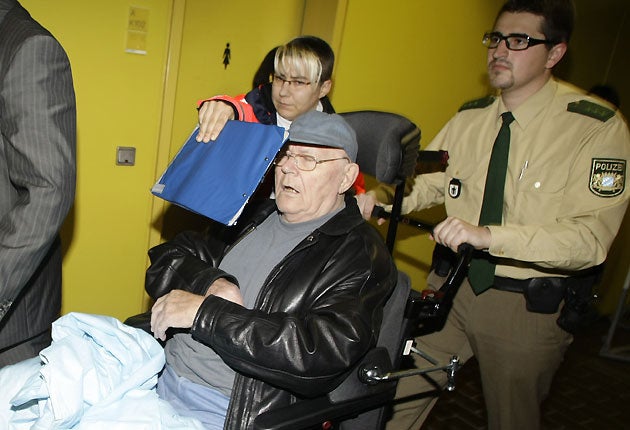Nazi guard faces trial from his wheelchair

Your support helps us to tell the story
This election is still a dead heat, according to most polls. In a fight with such wafer-thin margins, we need reporters on the ground talking to the people Trump and Harris are courting. Your support allows us to keep sending journalists to the story.
The Independent is trusted by 27 million Americans from across the entire political spectrum every month. Unlike many other quality news outlets, we choose not to lock you out of our reporting and analysis with paywalls. But quality journalism must still be paid for.
Help us keep bring these critical stories to light. Your support makes all the difference.
he trial of John Demjanjuk, an 89-year-old former guard at a Nazi camp, opened today on charges of helping to force 27,900 Jews into gas chambers at Sobibor death camp in 1943.
Demjanjuk, a former US carworker, was pushed in a wheelchair with a headrest before the court at what is likely to be Germany's last big trial from the Nazi era. Wearing a cap and in a reclined position, he was draped in a light-blue blanket.
German state prosecutors accuse Demjanjuk, who was top of the Simon Wiesenthal Center's list of most-wanted war criminals, of assisting in killings at the Sobibor death camp, in what is now Poland, where at least 250,000 Jews were murdered.
He denies he was involved in the Holocaust and his family insists he is too frail to stand trial.
"Justice takes a long time. I am not seeking revenge for Demjanjuk. He should tell the truth," said plaintiff Thomas Blatt, whose family was killed at the camp in 1943 and who at 15 was ordered to sort out belongings of Jews sent to be gassed.
"Today is important because it is the last big international case that everyone is interested in."
Demjanjuk was fairly motionless at the packed proceedings, his mouth occasionally dropped open. He was pale and his eyes were closed most of the time. He showed no expression and it was impossible to tell if he was aware of what was being said.
"Demjanjuk put on a great act," said Efraim Zuroff, director of the Simon Wiesenthal Center's Israel Office. "He should have gone to Hollywood, not Sobibor."
Demjanjuk's son said his father had been in hospital for five days in the last week to undergo tests and had a blood transfusion due to a bone marrow disease. The medical officer charged with assessing Demjanjuk said he was fit for trial.
Due to his weak condition, hearings will be restricted to two 90-minute sessions a day. His lawyer, Guenther Maull, said he was in pain and suffered from periods of mental absence.
Demjanjuk, who was born in Ukraine and fought in the Red Army before being captured by the Nazis and recruited as a camp guard, was extradited in May from the United States where he had lived in a suburb of Cleveland, Ohio.
He emigrated to the United States in 1951, becoming a naturalised citizen in 1958, and worked in the auto industry.
Another defence lawyer Ulrich Busch argued the foundation of the trial was flawed and it should be called off as Nazis in more senior positions and collaborators had not been convicted.
Busch said that to save his life a Trawniki (a Red Army prisoner recruited by the SS for death camps) had to cooperate.
"This Trawniki (Demjanjuk), nobody knew what he did, for him to be deported or even imported 7,000 kilometres while others are left untouched, what is the reason for this?"
The court must decide by Wednesday whether to accept Busch's argument. Meanwhile, the judge decided the trial, which is expected to last until May, would continue.
If all goes to plan, the prosecution will read the charges on Monday and Demjanjuk, who could be sentenced to spend the rest of his life behind bars, will have the chance to respond. Prosecutors plan to show the court documents, including an identity card, which they say prove he was at Sobibor and they will call about 20 witnesses.
"Mr Blatt (a plaintiff) isn't doing this out of revenge or to be compensated," said his lawyer Stefan Schuenemann, adding:
"Mr Blatt thinks that after such a long time it is too late for atonement ... It is important for him that the story of Sobibor ... is today given a platform so that he can describe the terrible murders that were carried out in this extermination camp 66 years ago."
While the case has attracted enormous global interest, many Germans would prefer to draw a line under the Nazi past and focus on a Germany's new-found role on the world stage.
Although he has acknowledged being at other camps, Demjanjuk has denied he was in Sobibor, which prosecutors say was run by 20-30 Nazi SS members and up to 150 former Soviet war prisoners.
Demjanjuk was extradited from the United States to Israel in 1986, accused of being "Ivan the Terrible", a notoriously sadistic guard at the Treblinka death camp. He was sentenced to death in 1988 but his conviction was overturned when new evidence showed another man was probably "Ivan".
In the Sobibor gas chambers, Jews died in 20 to 30 minutes after inhaling a toxic mix of carbon monoxide and carbon dioxide, say prosecutors, who argue that Demjanjuk was at the camp for about six months in 1943.
Subscribe to Independent Premium to bookmark this article
Want to bookmark your favourite articles and stories to read or reference later? Start your Independent Premium subscription today.
Join our commenting forum
Join thought-provoking conversations, follow other Independent readers and see their replies
Comments